Note: There is now a newer Novel Coronavirus (COVID-19) Situation Report 52.
WHO Novel Coronavirus (COVID-19) Situation Report 51
- WHO Director-General in his regular media briefing today stated that WHO has been assessing this outbreak around the clock and we are deeply concerned both by the alarming levels of spread and severity, and by the alarming levels of inaction. WHO therefore have made the assessment that COVID-19 can be characterized as a pandemic. For detailed information, please see here.
- Four new countries/territories/areas (Bolivia [Plurinational State of], Jamaica, Burkina Faso and the Democratic Republic of the Congo) have reported cases of COVID-19 in the past 24 hours.
- The COVID-19 virus infects people of all ages. However, evidence to date suggests that two groups of people are at a higher risk of getting severe COVID-19 disease. These are older people; and those with underlying medical conditions. WHO emphasizes that all must protect themselves from COVID-19 in order to protect others. For more information, please see ‘subject in focus’ below.
- On 10 March, the IFRC, UNICEF andWHOissuedanew guidance to help protect children and schools from transmission of the COVID-19 virus. The guidance provides critical considerations and practical checklists to keep schools safe. More information can be found here.
Risk Assessment
China: Very High
Regional Level: Very High
Global Level: Very High
Coronavirus Situation in Numbers
Globally
- 118,326 confirmed cases (4,627 new)
- 4,292 deaths (280 new)
China
- 80,955 confirmed cases (31 new)
- 3,162 deaths (22 new)
Outside of China
- 37,371 confirmed cases (4,596 new)
- 113 countries/territories (4 new)
- 1,130 deaths (358 new)
Situation In Focus: Risk Communication guidance – COVID-19, older adults and people with underlying medical conditions
The virus that causes COVID-19 infects people of all ages. However, evidence to date suggests that two groups of people are at a higher risk of getting severe COVID-19 disease. These are older people (that is people over 60 years old); and those with underlying medical conditions (such as cardiovascular disease, diabetes, chronic respiratory disease, and cancer). The risk of severe disease gradually increases with age starting from around 40 years. It’s important that adults in this age range protect themselves and in turn protect others that may be more vulnerable.
WHO has issued advice for these two groups and for community support to ensure that they are protected from COVID-19 without being isolated, stigmatized, left in a position of increased vulnerability, or unable to access basic provisions and social care. This advice covers the subject of receiving visitors, planning for supplies of medication and food, going out safely in public, and staying connected with others through phone calls or other means. It is essential that these groups are supported by their communities during the COVID-19 outbreak. WHO emphasizes that all people must protect themselves from COVID-19, which will also protect others.
Key advice for older adults and people with pre-existing conditions:
- When you have visitors to your home, exchange “1-meter greetings,” like a wave, nod, or bow.
- Ask visitors and those you live with to wash their hands.
- Regularly clean and disinfect surfaces in your home, especially areas that people touch a lot.
- If someone you live with isn’t feeling well (especially with possible COVID-19 symptoms), limit your shared spaces.
- If you become ill with symptoms of COVID-19, contact your healthcare provider by telephone before visiting your healthcare facility.
- Make a plan in preparation for an outbreak of COVID-19 in your community.
- When you go out in public, follow the same preventative guidelines as you would at home.
- Stay up to date using information from reliable sources
Countries, territories or areas with reported laboratory-confirmed COVID-19 cases and deaths, March 11, 2020
| Country/Territory/Area | Confirmed Cases |
|---|---|
| China | 80955 |
| Italy | 10,149 |
| Iran | 8042 |
| Republic of Korea | 7513 |
| France | 1774 |
| Spain | 1639 |
| Germany | 1296 |
| International (Cruise Ship in Japan) | 706 |
| United States of America | 696 |
| Japan | 568 |
| Switzerland | 491 |
| Netherlands | 382 |
| United Kingdom | 373 |
| Sweden | 326 |
| Norway | 277 |
| Belgium | 267 |
| Denmark | 262 |
| Austria | 182 |
| Singapore | 166 |
| Malaysia | 129 |
| Australia | 112 |
| Bahrain | 110 |
| Canada | 93 |
| Greece | 89 |
| Israel | 75 |
| United Arab Emirates | 74 |
| Kuwait | 69 |
| San Marino | 63 |
| Czech Republic | 61 |
| Iceland | 61 |
| Iraq | 61 |
| India | 60 |
| Egypt | 59 |
| Thailand | 59 |
| Philippines | 49 |
| Lebanon | 41 |
| Portugal | 41 |
| Finland | 40 |
| Vietnam | 35 |
| Brazil | 34 |
| Ireland | 34 |
| Slovenia | 31 |
| Palestinian Territory | 30 |
| Indonesia | 27 |
| Romania | 25 |
| Qatar | 24 |
| Georgia | 23 |
| Poland | 22 |
| Algeria | 20 |
| Saudi Arabia | 20 |
| Oman | 18 |
| Argentina | 17 |
| Chile | 17 |
| Croatia | 16 |
| Pakistan | 16 |
| Ecuador | 15 |
| Costa Rica | 13 |
| Estonia | 13 |
| Hungary | 13 |
| Serbia | 12 |
| Peru | 11 |
| Albania | 10 |
| Azerbaijan | 9 |
| Belarus | 9 |
| Latvia | 8 |
| Maldives | 8 |
| Panama | 8 |
| Mexico | 7 |
| North Macedonia | 7 |
| Russian Federation | 7 |
| Slovakia | 7 |
| South Africa | 7 |
| Bulgaria | 6 |
| Tunisia | 6 |
| Dominican Republic | 5 |
| French Guiana | 5 |
| Luxembourg | 5 |
| New Zealand | 5 |
| Paraguay | 5 |
| Afghanistan | 4 |
| Bosnia and Herzegovina | 4 |
| Malta | 4 |
| Senegal | 4 |
| Bangladesh | 3 |
| Cambodia | 3 |
| Colombia | 3 |
| Martinique | 3 |
| Morocco | 3 |
| Republic of Moldova | 3 |
| Bolivia | 2 |
| Burkina Faso | 2 |
| Cameroon | 2 |
| Cyprus | 2 |
| Faroe Islands | 2 |
| Nigeria | 2 |
| Saint Martin | 2 |
| Andorra | 1 |
| Armenia | 1 |
| Bhutan | 1 |
| Brunei Darussalam | 1 |
| Democratic Republic of the Congo | 1 |
| Gibraltar | 1 |
| Guernsey | 1 |
| Holy See | 1 |
| Jamaica | 1 |
| Jordan | 1 |
| Liechtenstein | 1 |
| Lithuania | 1 |
| Monaco | 1 |
| Mongolia | 1 |
| Nepal | 1 |
| Saint Barthélemy | 1 |
| Sri Lanka | 1 |
| Togo | 1 |
| Ukraine | 1 |
| Total | 118326 |
Recommendations and Advice for the Public
If you are not in an area where COVID-19 is spreading, or if you have not traveled from one of those areas or have not been in close contact with someone who has and is feeling unwell, your chances of getting it are currently low. However, it’s understandable that you may feel stressed and anxious about the situation. It’s a good idea to get the facts to help you accurately determine your risks so that you can take reasonable precautions.
Your healthcare provider, your national public health authority and your employer are all potential sources of accurate information on COVID-19 and whether it is in your area. It is important to be informed of the situation where you live and take appropriate measures to protect yourself.
If you are in an area where there is an outbreak of COVID-19 you need to take the risk of infection seriously. Follow the advice issued by national and local health authorities. Although for most people COVID-19 causes only mild illness, it can make some people very ill. More rarely, the disease can be fatal. Older people, and those with pre-existing medical conditions (such as high blood pressure, heart problems or diabetes) appear to be more vulnerable.

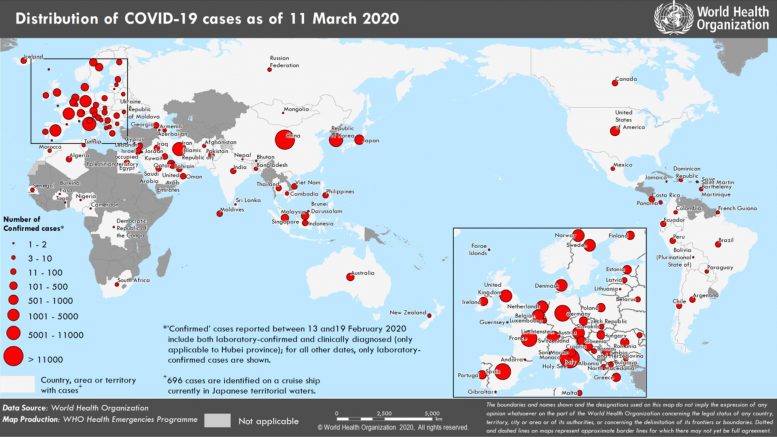
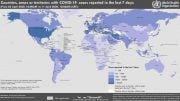
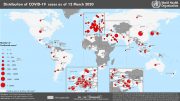
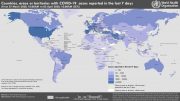
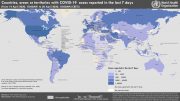
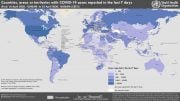
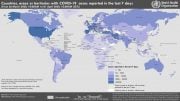
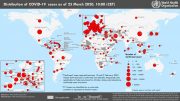
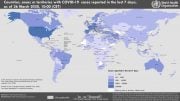
Be the first to comment on "Spike in US Coronavirus Infections as Confirmed Cases Worldwide Tops 118,000 in 114 Countries"